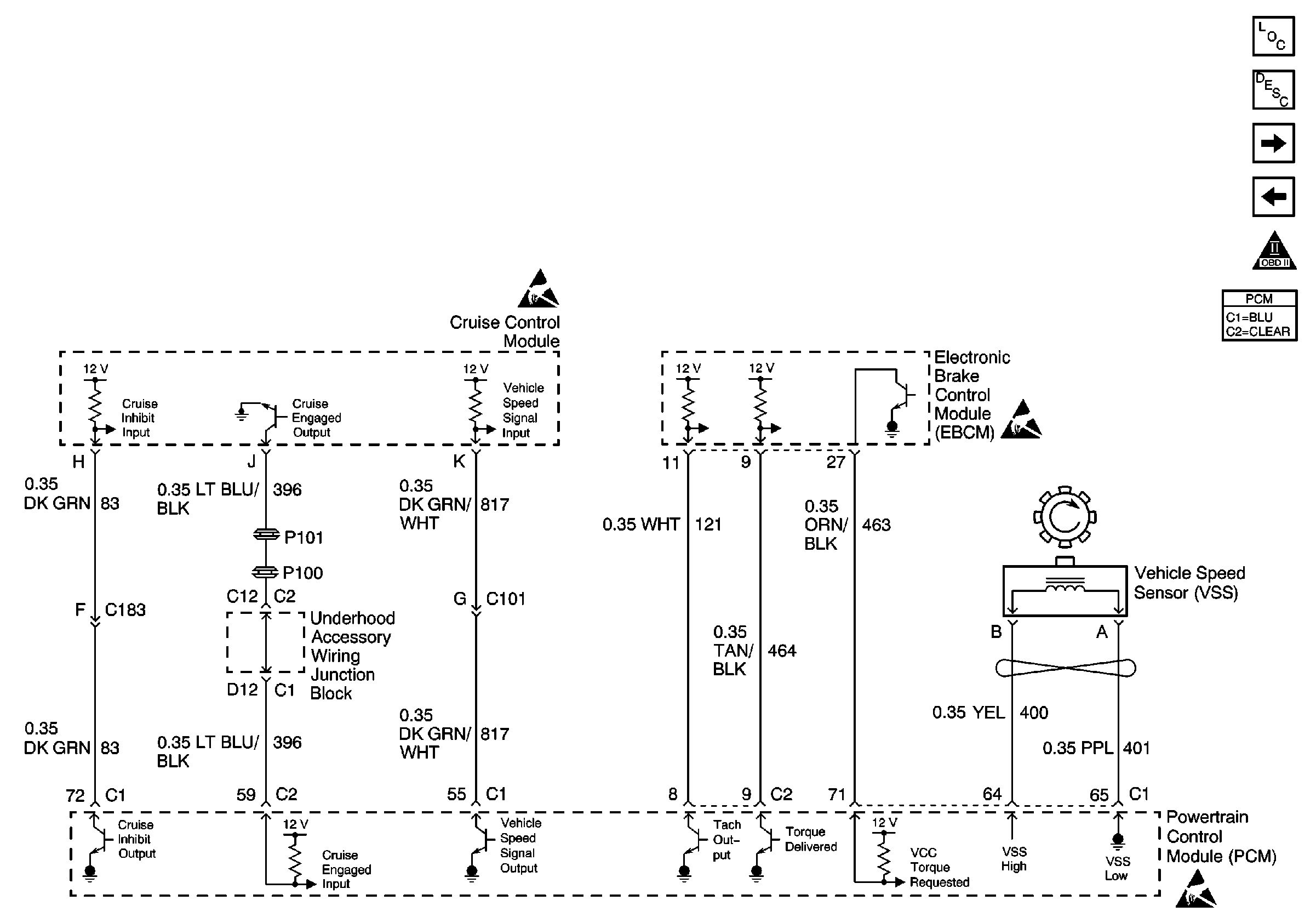Refer to Engine Controls Schematics
Cruise Control Module, EBCM and VSS

.
Circuit Description
The PCM has the ability to disable the cruise control if any conditions are detected which would make cruise control operation undesirable. The following conditions may cause the cruise control to be inhibited by the PCM:
| • | The engine is not running long enough for cruise control operation. |
| • | The transaxle range switch indicates Park, Neutral, Low, or Reverse gear is selected. |
| • | The engine speed is too high or too low. |
| • | The vehicle speed is too high or too low. |
| • | The ABS system is active for longer than 2 seconds. |
| • | The vehicle acceleration or deceleration rate is too high. |
If any of these conditions are present, the PCM opens the ground on the cruise inhibit circuit to request that cruise control be disengaged. The cruise control module detects the high signal voltage and disables the system. If the cruise engaged signal indicates that cruise control is still engaged while the PCM is inhibiting cruise control operation, DTC P1554 will be set.
Conditions for Setting the DTC
| • | The PCM is commanding the stepper motor cruise control (SMCC) module to inhibit cruise control operation. |
| • | The Cruise Status circuit signal indicates that the cruise control is engaged. |
| • | The above conditions are present for more than 1 second. |
Action Taken When the DTC Sets
| • | The powertrain control module (PCM) stores the DTC information into memory when the diagnostic runs and fails. |
| • | The malfunction indicator lamp (MIL) will not illuminate. |
| • | The PCM records the operating conditions at the time the diagnostic fails. The PCM stores this information in the Failure Records. |
Conditions for Clearing the MIL/DTC
| • | A History DTC will clear after 40 consecutive warm-up cycles, if no failures are reported by this or any other non-emission related diagnostic. |
| • | The current DTC will clear when the diagnostic runs and does not fail. |
| • | Use a scan tool in order to clear the MIL diagnostic trouble code. |
| • | Interrupting the PCM battery voltage may or may not clear DTCs. This practice is not recommended. Refer to Powertrain Control Module Description , Clearing Diagnostic Trouble Codes. |
Diagnostic Aids
Notice: Use the connector test adapter kit J 35616-A for any test that
requires probing the following items:
• The PCM harness connectors • The electrical center fuse/relay cavities • The component terminals • The component harness connector
If DTC P1554 cannot be duplicated, the information included in the Failure Records data can be useful in determining how many ignition cycles have passed since the DTC was last set.
If the problem is intermittent, refer to Intermittent Conditions .
Test Description
The number below refers to the step number on the diagnostic table.
Step | Action | Value(s) | Yes | No |
|---|---|---|---|---|
1 | Was the Powertrain On-Board Diagnostic (OBD) System Check performed? | -- | ||
2 | Is DTC P1585 also set? | -- | ||
3 |
Is the voltage near the specified value? | 12 V | ||
4 |
Does the test lamp illuminate? | -- | ||
5 |
Was a problem found? | -- | ||
6 | Replace the cruise control module. Refer to Cruise Control Module Replacement in Cruise Control. Is the action complete? | -- | -- | |
|
Important:: The replacement PCM must be programmed. Replace the PCM. Refer to Powertrain Control Module Replacement/Programming . Is the action complete? | -- | -- | ||
8 | Locate and repair a short to ground in the Cruise Engaged circuit. Refer to Wiring Repairs in Wiring Systems. Is the action complete? | -- | -- | |
9 |
Did DTC P1554 set? | -- | System OK |
